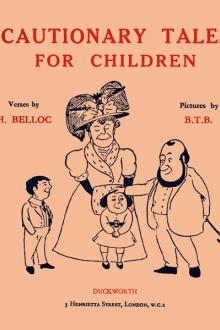The Basket of Flowers, Christoph von Schmid [red white royal blue txt] 📗

- Author: Christoph von Schmid
- Performer: -
Book online «The Basket of Flowers, Christoph von Schmid [red white royal blue txt] 📗». Author Christoph von Schmid
The old people set off in the carriage the next morning, followed by the blessings of their son and the secret ill-wishes of their daughter-in-law.
But the unnatural conduct of this wicked woman was visited with the trouble which is always the lot of avarice and inhumanity. Her secretly-cherished god was gold, and she had lent the bulk of her money to a merchant to use in his business, on his promise to pay her a large interest for the loan. Her greatest pleasure was in making calculations, as to how much her money would amount to after a certain number of years, with all the interest and compound interest added. Suddenly, however, these golden dreams received a rude awakening. The manufacturer's speculations proved unfortunate, and he shortly afterwards failed in business, and his goods were sold by order of the sheriff.
The news came as a thunder-stroke for the farmer's wife, and from the moment that she heard of the catastrophe she had no repose. Every day she kept running to the lawyers, or to her neighbours to complain of her hard lot, and the nights she spent in weeping and scolding her husband. From the wreck of her fortune of ten thousand florins she received only a paltry hundred or two, and so deeply did she feel the loss of her money that she openly declared her wish to die. The result of the continual worrying induced a fever which never left her. When her husband wished to send for a physician she would not consent to it, and when, in spite of her objections, he at last sent for one, his wife in a passion threw the medicine he prescribed out of the window.
At last her husband saw that she was seriously ill, and he requested the minister of Erlenbrunn to come and see her. The good old man visited her frequently and talked to her affectionately, in order to induce her to repent of her sins, and to detach her heart from the things of this earth, that she might turn to God.
But this advice made her very angry. She looked at the good man with utter astonishment. "I do not know," she said, "for what purpose the minister comes to preach repentance to me. He should have delivered such a sermon to the merchant who stole our money. Yes, there would have been some sense in that. As for me, I do not see that I have any reason for repentance. As long as I was able to go out I always went to church, and I have never failed to say my prayers. I have not ceased all my life to do my duty and to behave myself like a virtuous housewife. I defy any living soul to slander me. And of all the poor people who have come to my door, not one can complain that I sent them away without giving them something. Now, I should like to know how any one can behave better!"
The venerable pastor saw that she was justifying herself before God, and he tried by adopting a more direct tone to lead her to contrition. He showed to her that she loved money more than anything else in the world, and that the love of money was idolatry. He showed her that the bursts of anger in which she had indulged were heinous sins before God, that she had totally failed in the most beautiful of all Christian virtues—filial affection; that by her greed of money she had made her husband unhappy, cruelly driven away the poor orphan Mary, and even turned away her husband's parents, those whom she ought to have cherished as if they were her own.
He showed her also that, with a fortune like hers, a little piece of bread given to a poor man to get rid of him did not fulfil the duties which God expected of her, that in spite of all her boasting of going to church she was none the better of it, for her prayers had come from a heart unwarmed by love, and could not ascend to the throne of God. In this faithful way did he talk to her, but only with the result of making her burst into a fit of passionate sobbing.
The illness from which she suffered was a long and trying one. She spent whole nights in coughing, and yet the ruling passion of avarice was so strong that she would scarcely take sufficient nourishment to sustain her. No consoling thought came to her to mitigate her suffering. She was utterly unwilling to resign herself to God and to submit to His will.
The good minister tried in every imaginable way to bring her to a better frame of mind. During the last days of her life she was occasionally a little softened in her manners, but she never evinced any true repentance. In the flower of her age she died, a sad instance of the effects of avarice, passion, and love of the world.
CHAPTER XX.
FORGIVING AN ENEMY.
And now we must return to Mary whom we left in her new surroundings.
Immediately after leaving Pine Farm, Mary went with the Count's family to the city, in which they spent part of every year. While they were there, a clergyman came one morning to their residence and asked to see Mary. He told her that he was charged with a message for her from a person who was very ill and probably near death, and who desired anxiously to speak to her. The clergyman said that the person was not willing to give her message to any one but to Mary herself.
Mary could not imagine what the woman could want with her, and she consulted the Countess as to what she ought to do. The Countess, knowing the clergyman to be a pious and prudent man, advised Mary to go with him, and at the minister's request old Anthony the huntsman accompanied them. After a long walk to the outskirts of the town, they arrived at last at a house situated in a side street, which presented a most gloomy aspect. "Here is the house," said the clergyman, knocking at the door, "but wait a little."
After a few moments he returned for Mary, who then entered with him into a most miserable room. The window was narrow and dark, and some broken panes were patched with paper. The only furniture which the room contained was a miserable truckle-bed, covered with a more miserable mattress, and a broken chair, on which stood a stone pitcher, with neither handle nor cover.
On the miserable bed lay stretched a figure which to Mary's eyes seemed more like a skeleton, but which she gradually made out was the form of a woman, in the last stages of illness.
In a voice which resembled the rattle of death, this miserable creature sought to speak with Mary, who trembled in every limb. It was with the utmost difficulty that she could make out what the poor woman said, but at last she learned, to her horror, that the frightful phantom was Juliette, who at the Castle of Eichbourg had been the beginning and cause of all her distress. After being turned away from the Castle, she had gone from bad to worse, until she had sunk into her present state.
Lying upon her miserable bed, death staring her in the face, remorse had overtaken her, and her one wish was to have Mary's forgiveness. Learning in some way, that the Count and his family were in the city, she begged of the clergyman who was visiting her to ask Mary to come to see her. The poor woman, judging Mary by herself, had entreated the clergyman not to mention her name in case Mary would not come.
Mary was affected to the heart when she heard Juliette's story, and she shed tears of sympathy with her old enemy. She assured her that she had forgiven her long ago, and that the only feeling she experienced was that of the deepest pity for her.
Mary was affected to the heart when she heard Juliette's story.
"Mary was affected to the heart when she heard Juliette's story."
See page 142.
"Alas," said Juliette, "I am a great sinner; I have deserved my fate. Forgetfulness of God, contempt of good advice, love of dress, flattery, and pleasure were the first causes of misery, and these have brought me to my present state. Oh," cried she, raising her voice to a shriek, and weeping bitterly, "that is nothing to the fate which I fear awaits me in the world to come. You have pardoned me, it is true, but I feel the weight of God's anger now settling on my soul."
Mary conversed long and earnestly with her, endeavouring to point her to the Saviour of the world, who would receive her if she truly repented. At last she was obliged to leave her without being satisfied as to her state of mind, but the idea of the unhappy Juliette dying without hope continually pressed on her mind and weighed down her spirits. She recollected her little apple tree in blossom, withered by the frost, and what her father had said on that occasion. The most consoling words he had said on his deathbed presented themselves to her mind, and she renewed the promise she had made to God to live entirely to His glory.
To the Countess she related her discovery, and that generous lady sent the unhappy Juliette medicine, food, and linen, and everything which might tend to relieve her illness. But it was too late, and at the age of twenty-three the once beautiful Juliette, reduced to a mere skeleton and disfigured by disease, died without having given evidence of a changed heart towards God.
CHAPTER XXI.
CONCLUSION.
The next spring, when the country was covered with verdure and flowers, the Count, accompanied by his wife, and daughter, and Mary, went to his home at Eichbourg. Towards evening they approached the village, and when Mary saw in the light of the setting sun the familiar church steeple, the Castle, and the cottage where she had spent so many happy years with her father, she was so deeply touched that tears started to her eyes.
But in the midst of the sorrowful memories which the scene called up in her mind, there came to her a devout feeling of thankfulness for the wonderful way in which God had led her back.
"When I left Eichbourg," she said, "it was in disgrace, and without ever expecting to come back again. The ways of Providence are mysterious, but God is good."
When the carriage stopped at the Castle, the servants and officers belonging to the Count's household were waiting to receive them. Mary had a warm welcome from them all. Every one showed the greatest joy at seeing her again, and their congratulations on her innocence having been proved were manifestly sincere. The old judge who had





Comments (0)